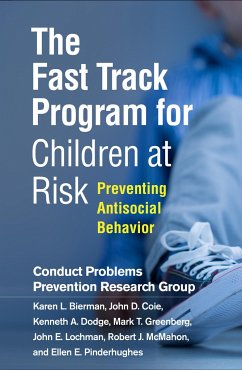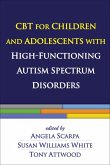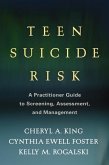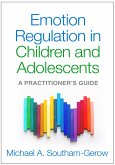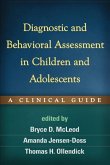Conduct Problems Prevention Research Group, Karen L Bierman, John D Coie, Kenneth A Dodge, Mark T Greenberg, John E Lochman, Robert J McMahon, Ellen E Pinderhughes
The Fast Track Program for Children at Risk
Preventing Antisocial Behavior
Conduct Problems Prevention Research Group, Karen L Bierman, John D Coie, Kenneth A Dodge, Mark T Greenberg, John E Lochman, Robert J McMahon, Ellen E Pinderhughes
The Fast Track Program for Children at Risk
Preventing Antisocial Behavior
- Gebundenes Buch
- Merkliste
- Auf die Merkliste
- Bewerten Bewerten
- Teilen
- Produkt teilen
- Produkterinnerung
- Produkterinnerung
This unique volume reports on the largest long-term preventive intervention study ever conducted with children at risk for serious violence and poor life outcomes.
Andere Kunden interessierten sich auch für
![The Mindfulness Matters Program for Children and Adolescents The Mindfulness Matters Program for Children and Adolescents]() Randye J SempleThe Mindfulness Matters Program for Children and Adolescents71,99 €
Randye J SempleThe Mindfulness Matters Program for Children and Adolescents71,99 €![CBT for Children and Adolescents with High-Functioning Autism Spectrum Disorders CBT for Children and Adolescents with High-Functioning Autism Spectrum Disorders]() CBT for Children and Adolescents with High-Functioning Autism Spectrum Disorders90,99 €
CBT for Children and Adolescents with High-Functioning Autism Spectrum Disorders90,99 €![Early Start Denver Model for Young Children with Autism Early Start Denver Model for Young Children with Autism]() Sally J RogersEarly Start Denver Model for Young Children with Autism116,99 €
Sally J RogersEarly Start Denver Model for Young Children with Autism116,99 €![Teen Suicide Risk Teen Suicide Risk]() Cheryl A KingTeen Suicide Risk42,99 €
Cheryl A KingTeen Suicide Risk42,99 €![Emotion Regulation in Children and Adolescents Emotion Regulation in Children and Adolescents]() Michael A Southam-GerowEmotion Regulation in Children and Adolescents59,99 €
Michael A Southam-GerowEmotion Regulation in Children and Adolescents59,99 €![Working with Children to Heal Interpersonal Trauma Working with Children to Heal Interpersonal Trauma]() Working with Children to Heal Interpersonal Trauma72,99 €
Working with Children to Heal Interpersonal Trauma72,99 €![Diagnostic and Behavioral Assessment in Children and Adolescents Diagnostic and Behavioral Assessment in Children and Adolescents]() Diagnostic and Behavioral Assessment in Children and Adolescents90,99 €
Diagnostic and Behavioral Assessment in Children and Adolescents90,99 €-
-
-
This unique volume reports on the largest long-term preventive intervention study ever conducted with children at risk for serious violence and poor life outcomes.
Hinweis: Dieser Artikel kann nur an eine deutsche Lieferadresse ausgeliefert werden.
Hinweis: Dieser Artikel kann nur an eine deutsche Lieferadresse ausgeliefert werden.
Produktdetails
- Produktdetails
- Verlag: Guilford Publications
- Seitenzahl: 211
- Erscheinungstermin: 30. Oktober 2019
- Englisch
- Abmessung: 231mm x 150mm x 23mm
- Gewicht: 454g
- ISBN-13: 9781462541294
- ISBN-10: 1462541291
- Artikelnr.: 56026306
- Herstellerkennzeichnung
- Libri GmbH
- Europaallee 1
- 36244 Bad Hersfeld
- gpsr@libri.de
- Verlag: Guilford Publications
- Seitenzahl: 211
- Erscheinungstermin: 30. Oktober 2019
- Englisch
- Abmessung: 231mm x 150mm x 23mm
- Gewicht: 454g
- ISBN-13: 9781462541294
- ISBN-10: 1462541291
- Artikelnr.: 56026306
- Herstellerkennzeichnung
- Libri GmbH
- Europaallee 1
- 36244 Bad Hersfeld
- gpsr@libri.de
Karen L. Bierman, PhD, is Evan Pugh University Professor, Professor of Psychology and Human Development and Family Studies, and Director of the Child Study Center at The Pennsylvania State University. Since the 1980s, her research has focused on social-emotional development and children at risk, with an emphasis on the design and evaluation of school-based programs that promote social competence, school readiness, and positive peer relations, and that reduce aggression and related behavior problems. Currently, she directs the Research-based Developmentally Informed (REDI) classroom and home visiting programs, developed in partnership with Head Start programs in Pennsylvania. A clinical psychologist, Dr. Bierman also directs a predoctoral training program in the interdisciplinary educational sciences. Dr. Bierman has served as an educational advisor to organizations including Head Start and Sesame Workshop. John D. Coie, PhD, is Professor Emeritus of Psychology and Neuroscience at Duke University. He is a past Chair of the National Institute of Mental Health grant review panel on prevention research. A developmental and clinical psychologist, Dr. Coie has primarily focused his research on the development and prevention of serious antisocial behavior. He retired from Duke in 2000 but continues to be involved with the Fast Track project and has developed and comanaged a program in Santa Barbara, California, for providing non-English-speaking Hispanic children with computer-based English language and reading training. He continues to be active in programs designed to reduce violence and recidivism in the community. Kenneth A. Dodge, PhD, is Pritzker Professor of Public Policy and Psychology and Neuroscience at Duke University. He is Founding and Emeritus Director of the Duke Center for Child and Family Policy. A clinical and developmental psychologist, Dr. Dodge studies early childhood development, prevention of violent behavior in the family, and public policy to improve population outcomes for communities. He is the developer of Family Connects, a population approach to improve children's outcomes in the first year of life. The author of more than 500 highly cited scientific articles, which have been cited more than 100,000 times, Dr. Dodge has been elected into the National Academy of Medicine and is the 2019-2021 President of the Society for Research in Child Development. Mark T. Greenberg, PhD, is Emeritus Professor in the College of Health and Human Development at The Pennsylvania State University, where he is also Founding Director of the Edna Bennett Pierce Prevention Research Center. A developmental psychologist, Dr. Greenberg is the author of over 350 journal articles and book chapters on the development of well-being; learning; and the effects of prevention efforts on children and families. He is a Founding Board Member of the Collaborative for Academic, Social, and Emotional Learning (CASEL). Dr. Greenberg is the recipient of numerous awards, including the Urie Bronfenbrenner Award for Lifetime Contribution to Developmental Psychology in the Service of Science and Society from the American Psychological Association. One of his current interests is how to help nurture awareness and compassion in our society. He is Chairperson of the Board of CREATE, a nonprofit devoted to improving the quality of schooling and the lives of teachers and students. John E. Lochman, PhD, ABPP, is Saxon Professor Emeritus in Psychology, Interim Director of the Alabama Life Research Institute, and Director Emeritus of the Center for Prevention of Youth Behavior Problems at the University of Alabama. He is also Adjunct Professor of Psychiatry and Behavioral Sciences at the Duke University Medical Center. A clinical psychologist, Dr. Lochman has authored more than 400 scientific articles, chapters, and books on the causes and consequences of highly aggressive behavior in childhood, and on the effects of intervention for this behavior. His current focus is research on dissemination, implementation, and adaptation of interventions. Dr. Lochman has served as Editor-in-Chief of the Journal of Abnormal Child Psychology and is a former President of the Society for Child and Family Policy and Practice (Division 37 of the American Psychological Association) and the American Board of Clinical Child and Adolescent Psychology. He is a recipient of the Distinguished Career Award from the Society of Clinical Child and Adolescent Psychology (Division 53 of the American Psychological Association). Robert J. McMahon, PhD, is Professor of Psychology at Simon Fraser University in Burnaby, British Columbia, Canada, where he is also B.C. Leading Edge Endowment Fund Leadership Chair in Proactive Approaches to Reducing Risk for Violence among Children and Youth. To carry out the work of the Chair, he directs the Institute for the Reduction of Youth Violence. He is also a senior scientist at the B.C. Children's Hospital Research Institute in Vancouver. A clinical psychologist, Dr. McMahon studies the assessment, treatment, and prevention of conduct problems and other problem behavior in children and youth, especially in the context of the family. He is author or editor of more than 250 books, scientific articles, chapters, and reviews; a past Editor-in-Chief of Prevention Science; and a recipient of the Service to SPR Award from the Society for Prevention Research and the Trailblazer Award from the Parenting and Families Special Interest Group, Association for Behavioral and Cognitive Therapies. Ellen E. Pinderhughes, PhD, is Professor in the Eliot-Pearson Department of Child Study and Human Development at Tufts University. A developmental and clinical psychologist, she studies contextual influences on and cultural processes in parenting among families facing different challenges. Dr. Pinderhughes's research interests include cultural socialization and preparation for bias among transracial adoptive parents; stigma; pathways to fatherhood and family life among gay fathers; and the role of race, ethnicity, and culture in parenting and youth outcomes. A past William T. Grant Faculty Scholar, Dr. Pinderhughes was a member of the Institute of Medicine Committee on Child Maltreatment Research, Policy, and Practice for the Next Decade: Phase II, which issued the report New Directions in Child Abuse and Neglect Research. She is a member of several boards focused on enhancing the lives of marginalized youth and families through research and practice.
Foreword, Patrick H. Tolan
1. Setting the Context for Youth Violence Prevention
2. The Developmental Model and Prevention Program Design
3. Project Design, Sample, and Screening
4. The Fast Track Intervention in the Elementary School Years
5. Impact of the Fast Track Intervention during the Elementary School Years
6. The Fast Track Intervention in Middle and High School
7. Outcomes during the Middle School and High School Years
8. Major Prevention Outcomes
9. Implications for Developmental Theory and Research on the Prevention of
Violence
10. How Can Communities Address the Problem of Future Violence by Focusing
on High-Risk Young Children?
1. Setting the Context for Youth Violence Prevention
2. The Developmental Model and Prevention Program Design
3. Project Design, Sample, and Screening
4. The Fast Track Intervention in the Elementary School Years
5. Impact of the Fast Track Intervention during the Elementary School Years
6. The Fast Track Intervention in Middle and High School
7. Outcomes during the Middle School and High School Years
8. Major Prevention Outcomes
9. Implications for Developmental Theory and Research on the Prevention of
Violence
10. How Can Communities Address the Problem of Future Violence by Focusing
on High-Risk Young Children?
Foreword, Patrick H. Tolan
1. Setting the Context for Youth Violence Prevention
2. The Developmental Model and Prevention Program Design
3. Project Design, Sample, and Screening
4. The Fast Track Intervention in the Elementary School Years
5. Impact of the Fast Track Intervention during the Elementary School Years
6. The Fast Track Intervention in Middle and High School
7. Outcomes during the Middle School and High School Years
8. Major Prevention Outcomes
9. Implications for Developmental Theory and Research on the Prevention of
Violence
10. How Can Communities Address the Problem of Future Violence by Focusing
on High-Risk Young Children?
1. Setting the Context for Youth Violence Prevention
2. The Developmental Model and Prevention Program Design
3. Project Design, Sample, and Screening
4. The Fast Track Intervention in the Elementary School Years
5. Impact of the Fast Track Intervention during the Elementary School Years
6. The Fast Track Intervention in Middle and High School
7. Outcomes during the Middle School and High School Years
8. Major Prevention Outcomes
9. Implications for Developmental Theory and Research on the Prevention of
Violence
10. How Can Communities Address the Problem of Future Violence by Focusing
on High-Risk Young Children?

